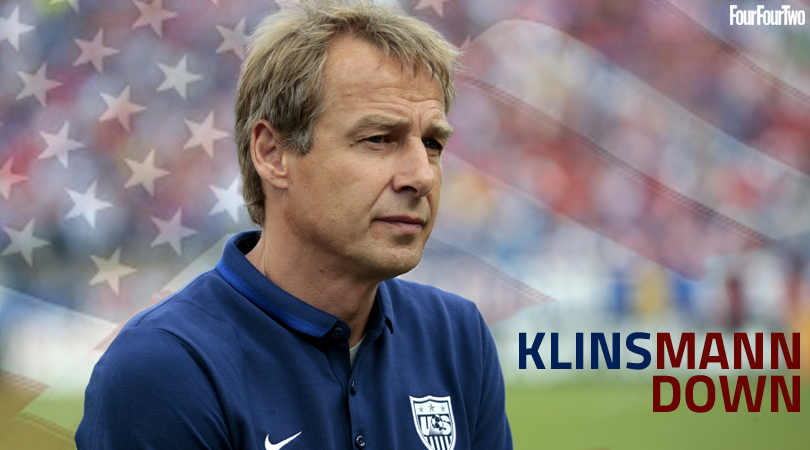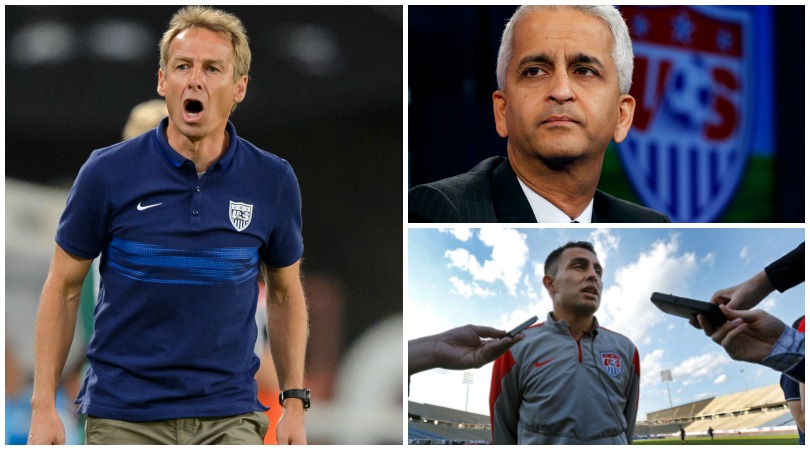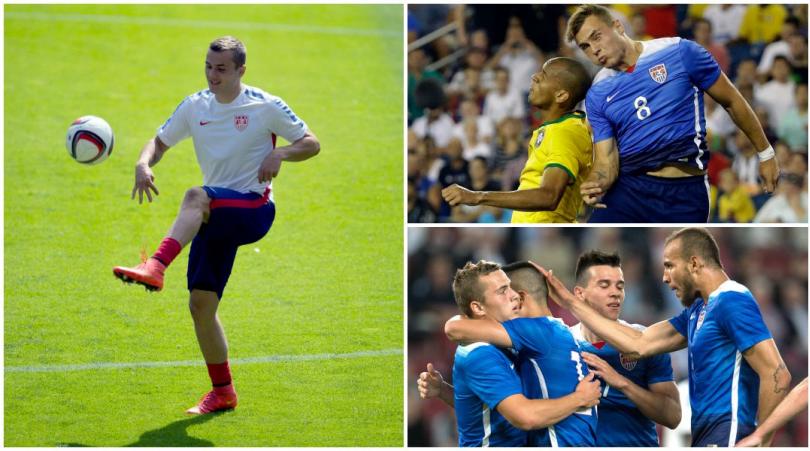Where it’s all going wrong for Jurgen Klinsmann and the United States
Relations are strained after back-to-back defeats over the international break, but what’s up exactly? Kristan Heneage explains...

In the wake of the United States’ 3-2 loss to Mexico last week, Jurgen Klinsmann sat down for his press conference – and then took a stand. “I'm not here to be liked,” the German quipped at reporters.
Over the course of three months he has lost a Gold Cup semi-final to Jamaica, a Confederations Cup play-off to Mexico and a friendly to neighbours Costa Rica, leaving him with few admirers. For the first time his position came under intense scrutiny, with a large section of supporters calling for him to be removed before 2018 World Cup qualification begins.
But that looks unlikely, in part due to the investment made by US Soccer president Sunil Gulati. The 56-year-old courted Klinsmann for years, returning to him even after the German had turned down the position. Gulati eventually got his man by handing Klinsmann a dual role as both head coach and technical director. That has in turn afforded the ex-Tottenham striker an easy riposte to criticism; that he is cultivating a culture as promised and that such things take time.
Child care
In attempting to instigate change, Klinsmann has endured an arduous relationship with Major League Soccer in the process
Certainly, his work there is mounting up. The lack of a defined tactical style among the different age groups is a concern. There are also deeper issues plaguing the game at a grassroots level. To play soccer in the States is still an expensive game; thus, children from lower-income families are often excluded and that narrows the pool of potential players.
In a country so vast, the need for synergy among the many youth clubs and professional teams is vital. However, some players still manage to slip through the cracks. Miguel Ibarra – a call-up under Klinsmann – was cut by the Portland Timbers due to roster restrictions, then cast into the wild west that is US professional soccer outside Major League Soccer. He found his way to Minnesota United thanks to the efforts of his college coach at UCI Irvine, George Kuntz – but with a lack of scouts in the system, it can be easy for players like Ibarra to fall out of the game.
In attempting to instigate change, Klinsmann has endured an arduous relationship with the MLS. He has spoken of his desire for the league to have promotion and relegation, and questioned the league's fixture scheduling in relation to U23 and U20 international games. Clubs are not obliged to release players on days specified for international play, something he feels is damaging to their attempts to qualify for the Rio Olympics in 2016. “Here we are a week or two away from games and Andi [Herzog, US U23 coach] doesn’t know the players he will have,” the German groaned earlier this year.
Get FourFourTwo Newsletter
The best features, fun and footballing quizzes, straight to your inbox every week.

That outburst came after a rather public spat with league commissioner Don Garber. Speaking about the return of Michael Bradley and Clint Dempsey to MLS, Klinsmann said it would be “very difficult” for the pair to maintain their best form, something Garber took issue with. While some have seen Klinsmann as a source of advice to young players, a report via ESPN this time last year claimed he was far more hands-on than was made out and actively pushed players to clubs (particularly in Europe).
Player power
That alone has won him few friends, although it doesn’t detract from issues on the pitch. Against Mexico the team looked slow and laboured in their play. They sat deep and appeared to have just one weapon – the counter-attack – in their arsenal. The quick transition is the one standout feature of the Klinsmann era, and players like Bobby Wood, DeAndre Yedlin and Jordan Morris have been favoured for their speed.

Meanwhile, Benny Feilhaber has been shunned for more defensive and workmanlike midfielders like Jermaine Jones. The Sporting Kansas City man's continued absence has been a notable point of discussion, as one of the leading assisters in Major League Soccer. He discussed his omission with the Guardian earlier this year. “I actually wish someone in the media would ask him that question to see if he has an answer. It would help me out,” he sighed.
Undeniably, though, Klinsmann has widened the national team pool. His ability to not only find the likes of Julian Green, Fabian Johnson and Gedion Zelalem but also convince them to play for the US has been impressive. An office based in Vienna, Austria, is Klinsmann's European hub; there, former Austria international Herzog uses his existing contacts to scout, check up on, and identify new talent.
The question now is whether that pool has been deepened as well as widened. Is Mix Diskerud a better option than Sebastian Lletget or the aforementioned Feilhaber? Statistically in MLS, the answer is no. That has led to frustration among US fans that only increases when the team struggles on the pitch.
Furthermore, criticism aimed at Klinsmann by former players has resurfaced.
“We practically only practiced fitness under Klinsmann,” Philipp Lahm said in his autobiography. “There was very little technical instruction and the players had to get together independently before the game to discuss how we wanted to play.”
Blame game
The German has often pointed fingers at the players, the system, and a variety of other excuses
While it can be argued that Lahm had a book to sell at the time, anyone watching the US play could imagine similarities between the two situations. It also permeates into another main issue with Klinsmann – his refusal to take responsibility.
The German has often pointed fingers at the players, the system, and a variety of other excuses. Jozy Altidore blamed media pressure, but rarely if ever has Klinsmann taken the load himself. In a friendly against Brazil he deployed Alejandro Bedoya in an unfamiliar midfield role. Unsurprisingly overrun, Bedoya was withdrawn in the first half with his coach blaming the player for 'failing to find his rhythm'.
Consequently, any of the post-World Cup euphoria that engulfed Klinsmann is now long gone. His public shaming of Fabian Johnson (the player had complained of muscle tightness during the Mexico game) was seen as the latest in a string of petty misdirections to cover his mistakes.
. is back at BORUSSIA-PARK and is being treated for a thigh injury. October 13, 2015
Yet despite all of this, Klinsmann remains in a seemingly secure position. Gulati is unlikely to dispense with him despite public opinion being so low. What seemed an inspiring appointment now seems a weight around the country's neck stalling the progress of an emerging soccer nation.
